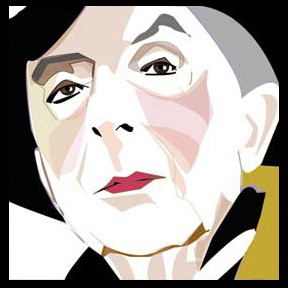|
A CENTENNIAL CELEBRATION! |
|
 |
THE QUENTIN CRISP ARCHIVES
ROBERT COCHRANE
Poet and writer
|
England is viewed by the wider world as a nation of eccentrics. This is considered a genetic characteristic, and something to be celebrated. Like most assumptions, the truth lies somewhat wide of the remark. Quentin Crisp, one such “National Treasure”, is now rightly revered as one, but his journey from pariah nuisance to that of sage-like venerability was a long and winding affair. He migrated to New York, remaining vital till the end, an amalgam of defiance and disappointment worn as wit.
Some considered him a latter-day Oscar Wilde, a comparison he didn't much value, remarking that he'd known many who'd been sent to prison for crimes of the flesh like Wilde's, without being broken or penning such bad verse. Unkind maybe, but Wilde had it all and lost it largely because of his own arrogance. He could have fled to Paris, had the chance to but didn't take it. As someone who'd faced a lifetime's disapproval, Crisp could afford to be short on sympathy. It was a luxury he had often been denied Consider this a fable, a fairy story of an alternative kind. It is a frosty Manhattan on Christmas morning. Imagine the perfect cliché of snow and sentiment. On the Lower East Side in tiny room, a very elderly person is propped up in bed, his normally immaculate confection of blue-rinsed hair has descended in straggly strands around his shoulders. He has the appearance of an even more Dickensian Miss Havisham than the original product of disappointed love. His elderly fingers are slowly opening his cards, good wishes from all over the world sent by people he has never met but whose lives he has influenced and inspired. One in particular is from a rich woman he has never encountered, but who routinely remembers the birthdays of those who have lived one hundred years. He has done so, a Christmas Day baby from 1908. The card is signed by the other Queen of England. She is someone he has been less than flattering about, having bemoaned a certain sadness that the richest lady in England should dress in such a matronly and mundane fashion. He has lived long enough to be recognized as the Queen of Otherness. The Pope of Dissidence. He reads the card, frowns and hisses, “Bitch! What has my century to do with you?” as he rips the expensively monogrammed card into a confetti of disgust with which he showers himself and the room, mirroring the image of winter outside. If it sounds too good to be a true story, it is because that is the case. Quentin Crisp died in suburban Manchester in November 1998. A product of the suburbs, rather befittingly he died in them. If you live long enough, sometimes, and only sometimes, you are forgiven for most of your sins. Dennis Pratt dyed his mane, became Quentin Crisp, maddening his middle-class parents and the other respectable inhabitants of the 1930s. A dandified effeminate with red-varnished toes, he strode through the sea of grey-suited masculinity to a rain of curses and blows. Such blatant a chorus of disapproval only drove him to greater acts of attention seeking. Those he felt he was striking a blow for, the queers, didn't want him in their gang. If their parties got raided, the presence of the gaudy Quentin would blow all their respectable cover, and such cover was essential in those blackmailing days when outing ended in prison or suicide, and sadly all too often, both. In his later years he reflectively admitted that he was somewhat deluded in his crimson-haired crusade. He was really only representing himself. That self became a walking work in progress. An occasional illustrator and full-time artists model, he became a visible postcard of from Bohemia. Gradually his isolation became a source of touchstone curiosity; radio and television interviews led to the publication of his autobiography in 1968. Given that his life modeling meant that he was on the payroll of the Education Department, he called it The Naked Civil Servant. He spent his life in a tiny room in Chelsea which he never cleaned, informing the world that after the first three years you need never dust again, since like snow it drifts into areas you never use. When that book was turned into a television drama in 1976, it transformed him, with a lot of benign brilliance from the actor John Hurt, into an overnight celebrity, delivering his strange life into the homes of those who never considered him a likelihood or possibility. Not that there were many such pensioners like Crisp. Although he wasn't the only pansy of his time, he was the one who bothered to write about his life, and then turned it into a one-man show he introduced archly as a “straight talk from a bent speaker.” He became an agony aunt for the dispossessed, and living proof that breaking the rules hadn't started, as many mistakenly believed, with Elvis, Jagger, or Bowie. He railed against the need for love, the desire to have a significant other, championing the need to develop a personal lifestyle. Just when it seemed that he would content himself with being “the Stately Homo of England,” the occasional chat show appearance and another article or book, he decamped to New York in 1982. First to the Chelsea Hotel, and then to a single room in a rough street on Manhattan's Lower East Side, ruled by a chapter of Hell's Angels. He even was celebrated in Sting’s song “An Englishman in New York.” Crisp could be a taxing friend. The novelist Kathleen Farrell (1912-1999), with whom he played chess, found him one day disinterested in their usual pursuit. He wanted to go the pub for a drink, where he had previously displayed no such desire to visit one. Farrell realized she was being thrown a test. Would she be prepared to face the looks of disapproval that their arrival in the local bar would generate? She accompanied him, nothing happened except the usual repressed English consternation, and their friendship remained, the chess playing continued, and the desire for public drinking was never mentioned again. Like all iconoclasts, Crisp eventually became entrapped by his own artifice. His withering views on love and the pointlessness of relationships were the product of an essentially romantic soul who'd been forced to concede that there was going to be no great dark man. When I interviewed him in 1996 he would have happily recited passages from his books, but if pressed, revealed glimpses of the inner man. I was confronted by a resolved but small person who generated a sad serenity. His response to how he felt about the abuse he'd generated in his youth betrayed lasting hurt. “You know they spat at me and said ‘you disgusting person!'” The grit his voice rallied for those final three words, betrayed an ancient and unresolved hurt. He brightened concerning New York. Standing on the sidewalk one morning, he realized he was being eyed up and down by a very large black gentleman. His sense of impending danger dissolved when he received a large smile and the comment “My oh my, we have got it all on today.” He leant across the table and whispered like a conspirator, “Now that would not happen in England!” In the crowded rickety lift at the Chelsea Hotel news was spreading of a stabbing on the premises. Sex Pistol Sid had stabbed his girlfriend Nancy. One resident gasped in horror at this snippet, emitting the immortal lines running ahead of her horror, “But how many times?” John Hurt is currently revisiting the role he completed when Crisp was in his late sixties. The New York Years will be a sequel and a delightful finishing touch, ending in rainy winter Manchester. His cremation took place at Southern Cemetery Chorlton. It was a gathering of seven, the sad practicality of dying on tour, a nationwide “Sold Out” tour of the U.K. As the mourners from the ceremony before left in their sorrow, they were confronted by a strange apparition. Stepping out of a taxi, a gingham-clad cross-dresser, garishly made up in a black wig and trainers, startled their drying tears. It was the performance poet Chloe Poems, who was to have introduced Crisp at his show at the Green Room. Even in death Crisp continued to startle, even in death, even at his own funeral. Quentin Crisp lived against the grain, eventually becoming a shaman for the shamed. He never stopped being a strange and unsettling character. Now, when anything goes, his stance becomes a sepia act of brazen yet vulnerable defiance. He remarked, on the death of Princess Diana, that she was trash and had it coming to her. Like Wilde, dead princesses got short shrift. His would have been a marvelous century, a crowning achievement for a dear old Queen. It is well worth contemplating what might have been, because it very nearly was. Consider this a fable because the whole thing reads as one. Much truth resides in fiction, and the same applies to what we know as the real world. Happy Birthday Mr. Crisp on Christmas Day, and may it snow in both Manhattan and Manchester. |

Site Copyright © 1999–2009 by the Quentin Crisp Archives.
All rights reserved.

